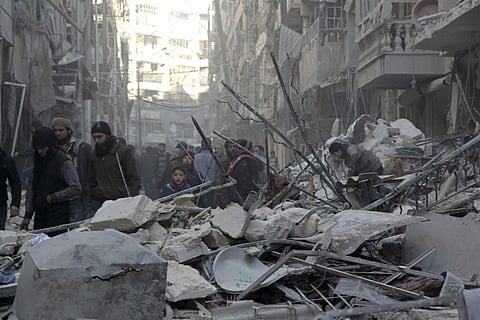Aleppo residents flee bombing as world debates refugee crisis
Humanitarian crisis in Syria is growing by the day with no solution in sight

The Washington Post said this latest battle in Syria has the potential to trigger a major new humanitarian crisis. The United Nations’ inability to deliver aid to towns besieged by government forces emerged as a major obstacle in the stalled talks. With rebel-held Aleppo almost entirely surrounded, there is a risk that hundreds of thousands of people living there soon could be cut off entirely. Aid agencies said the air strikes have forced an almost total suspension of aid deliveries across the Turkish border. “Opposition forces are losing ground by the minute. We’re looking at a nightmare humanitarian situation,” said Rae McGrath, director of operations in northern Syria and Turkey for the aid agency Mercy Corps. “There are a lot of people on the move,” he said. “This is certainly the worst situation we’ve seen since the beginning of the war.”
The New York Times highlighted the plight of residents. “The government gains have increased the sense of alarm among anti-government insurgents and their civilian supporters, sending thousands of people, including women and children with whatever they can carry, fleeing through orchards.”
The Toronto Star wrote: “The crisis in Syria worsens by the day. The civil war rages on, peace talks are faltering, Daesh [the self-proclaimed Islamic State of Iraq and the Levant] terrorises much of the country, cities lie in ruins, millions of Syrians have fled into exile, and aid is in short supply. As United Nations Secretary-General Ban Ki-moon put it, it’s ‘as close to Hell as we are likely to find on this Earth’.”
“Faced with a tragedy on this scale, there’s only so much the world can do to help. Even so, it’s good to see [Canadian] Prime Minister Justin Trudeau drawing up a more ambitious, better-integrated plan to address this calamity as the UN chief prepares to visit Ottawa next week to discuss Syria and Iraq, refugees, and other issues.
Bloomberg said the crisis in Syria remains a humanitarian disaster. Until a way is found to stop the war, the calculation is simple: Either developed nations act now to help Syria’s five million-plus refugees in the region, or the refugees will come to them. The rationale for assistance is more than charity — it is also self-interest.
The Guardian said Europe will feel the effects. “If Aleppo falls, Syria’s vicious war will take a whole new turn, one with far-reaching consequences not just for the region, but for Europe too. The latest government assault on the besieged northern Syrian city, which has caused tens of thousands more people to flee in recent days, is also a defining moment for relations between the West and Russia, whose air force is playing a key role. The defeat of anti-Al Assad rebels, who have partially controlled the city since 2012, would leave nothing on the ground in Syria but Al Assad’s regime and Daesh. And all hope of a negotiated settlement involving the Syrian opposition will vanish.” The paper said the prospect of another 300,000 refugees fleeing to Turkey underlines the fact that the real solution to the refugee crisis will only be found when the root causes of the war are addressed.”



